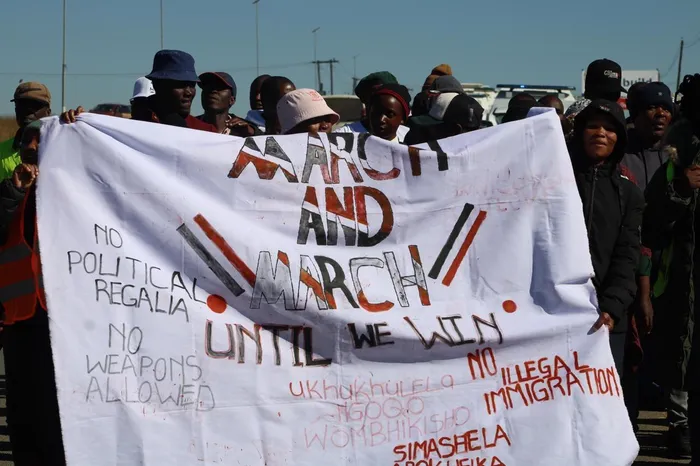Illegal ID checks at SA hospitals spark political outcry and government crackdown

Human rights groups and officials condemn the march in march vigilante group for illegally checking IDs at a public hospital, blocking access to essential care for immigrants and violating South Africa’s Constitution.
Image: March and March/Facebook
Outside Addington Hospital in Durban, patients arriving for care are being stopped - not by security or hospital staff, but by a group of self-appointed gatekeepers demanding to see identification.
The March and March Movement, a vigilante group with no legal authority, has taken it upon itself to screen anyone approaching the facility’s doors, targeting undocumented immigrants and turning away those who can’t produce South African IDs.
Last week, the group was caught on camera shoving 77-year-old Crispin Hemson, 77, a former director of the Centre for Non-violence at the Durban University of Technology, after he refused to show them his ID.
The group's message is blunt: public healthcare is for South Africans who can produce their ID.
Teresa Nortje, the group’s chairperson, makes no apologies.
“We’ve had an influx of undocumented immigrants who falsify papers,” she told IOL.
“We’re enforcing Section 17 of the Constitution and saying the country’s hospitals are for South Africans who pay tax.”
But while she cites constitutional rights to protest, the group’s actions fly in the face of another part of the Constitution - Section 27, which guarantees healthcare access to everyone in South Africa, regardless of immigration status.
And the Bill of Rights explicitly protects freedom of movement.
Critics say what’s happening at Addington is dangerously reminiscent of apartheid-era pass laws. Legal experts and government officials say that it is not only illegal and discriminatory, but a threat to public safety.
Among those affected is Christian Tchizungu Kwigomba, a Congolese father and long-time Durban resident.
After the birth of his twins at Addington, he returned for a vital follow-up appointment only to be stopped at the gate by the group. He says he was shoved while holding one of his newborns.
“I faced something that no human being should experience,” Kwigomba said. “Even pregnant women are being turned away. It’s a matter of life or death.”
Kwigomba, who is diabetic and relies on medication, says he cannot afford private care.
“We are just waiting to die,” he said. “They should remember the spirit of Ubuntu and stop kicking people out.”
The Department of Health has condemned the movement’s actions.
Spokesperson Foster Mohale called on protesters to raise concerns “within the confines of the law,” warning that the protests endanger lives and violate the Constitution and National Health Act.
“There’s a difference between being concerned and taking the law into your own hands,” Mohale said. “Everyone has the right to emergency and primary care.”
Security plans are now in place to prevent further intimidation. Police and public order units have been deployed to protect health workers and patients.
The government has emphasised a zero-tolerance policy toward any group or individual attempting to block access to public health facilities.
Meanwhile, rights groups, including the South African Human Rights Commission (SAHRC) and Section 27 are monitoring the situation.
IOL News